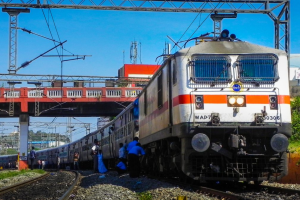The Bhitarkanika national park, a designated Ramsar wetland site, in Odisha’s Kendrapara district has re-established itself as an ideal habitation corridor for estuarine crocodiles with their population maintaining an upward graph as per the findings of the latest census of these reptiles.
Though the increase in population is marginal, the rise in the reptiles’ number is indicative of the fact that the national park has turned out to be a safe, congenial habitat for salt-water crocodiles, said Manas Das, Assistant Conservator of Forest, Rajnagar Mangrove (wildlife) Forest Division.
Advertisement
While 1826 salt-water crocodiles were counted this year along the water-bodies of Bhitarkanika river system and Mahanadi deltaic region while the census figure recorded last year stood at 1811, said the officer.
The growth in croc numbers has been mainly reported in hatchlings, yearlings and juvenile crocs. However, the adult and subadult crocs of 6 to 8 feet have also reported slight drop compared to last year, he said.
While 346 adults above 8 feet were counted this time, 348 adult species were sighted in 2024. Similarly 164 sub-adult (6 to 8 feet) crocs were found during this year’s annual census as against 167 counted in 2024.
The Annual Crocodile Estimation exercise was conducted in the Bhitarkanika National Park and Sanctuary, Gahirmatha Sanctuary, Mahanadi Deltaic areas. This year favourable weather conditions resulted in better sightings of crocodiles in the rivers and creeks, the official informed.
Estuarine crocodiles are also found in West Bengal’s Sundarbans, having the country’s largest mangrove cover. Besides the mangrove wetlands in Andaman Islands are home to these species, but those cannot match the density and population of crocodiles in wild habitats of Bhitarkanika.
Census was conducted both in day and night hours. Due to favourable climatic conditions such as clear and sunny weather, low day and night temperature in water and favourable tide conditions, counting of crocodiles was hassle-free.
The region is crisscrossed by innumerable water inlets, creeks and nullahs all forming the part of Bhitarkanika river system.
Incidentally Odisha is the only State in the country having all three species — gharial, mugger and saltwater crocodile in the wild. The State government had launched a conservation programme of these crocodile species in 1975. While the conservation initiative had yielded positive results as far as saltwater and mugger is concerned, it had failed in the Gharial conservation programme.











